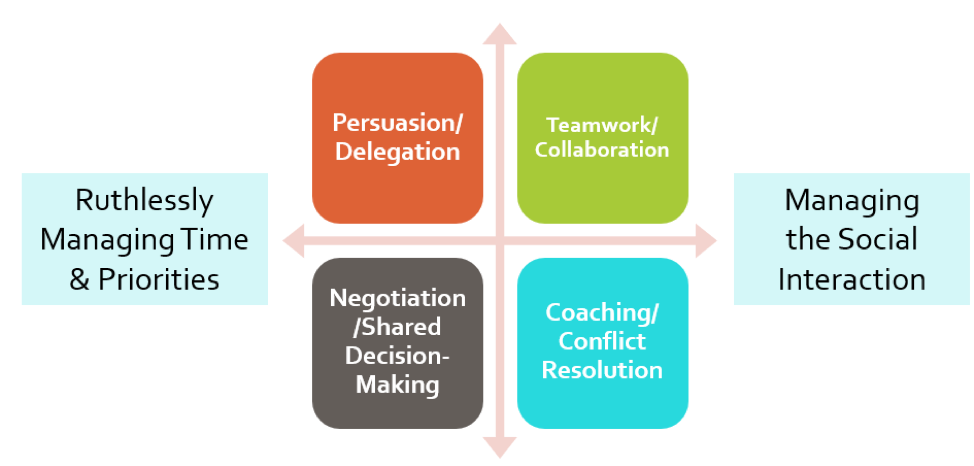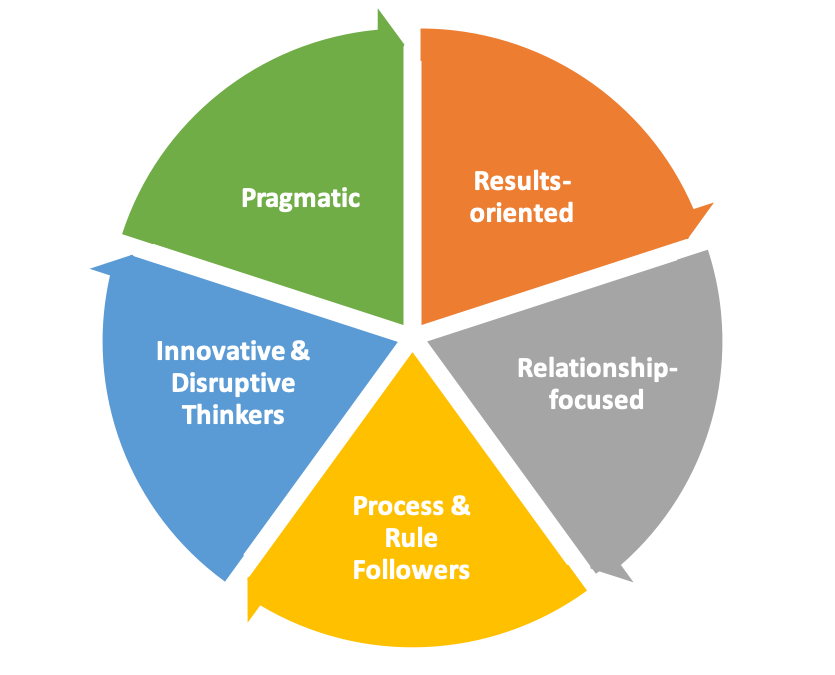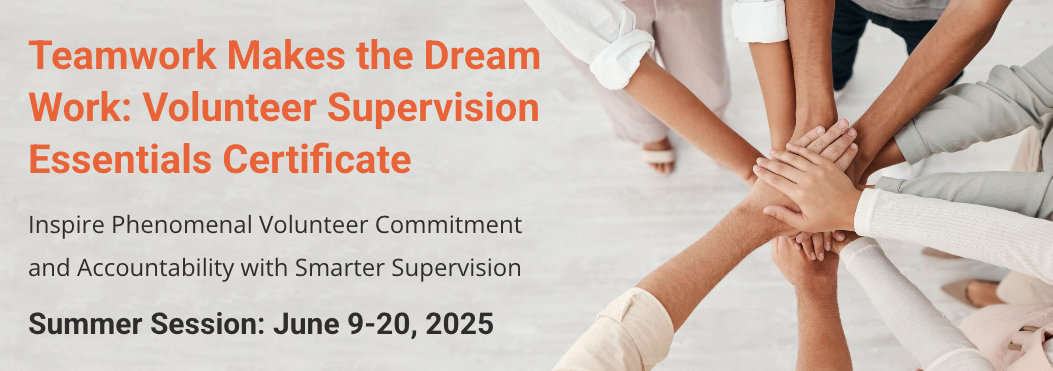
Chapter 5: Volunteer Supervision
Volunteer supervision can often be one of the more challenging aspects of engaging volunteers. It takes exceptional leadership skills. Some might argue that those that supervise volunteers need better leadership skills than those that support paid employees.
As a leader of volunteers, you need to be part cheerleader, part risk-taker, part herder, part teacher, and part visionary. It’s not easy balancing all of these qualities, but having an awareness of your own abilities and concentrating on your own growth can help guide you when supervising volunteers.
It first starts with your core values. Values relate directly to your credibility as a nonprofit leader. In order to do what you say you’ll do, you must know what you want to do and how you wish to behave. Taking time to examine your core values will help…
- Describe your “bottom line” limits
- Focus your energy amidst conflicting priorities
- Align you with your personal passions
- Strengthen your self-confidence, self-identity, security
- Help you discover how (and whether) your values align with those of your organization and your team
- Serve as your “compass”
Staff-led Volunteer Supervision
The four qualities people most admire in leaders are honesty, competence, forward-thought, and inspiration. How can nonprofit leaders channel these characteristics into actions that provide the best volunteer supervision? Here are some ways you can offer support while representing these leadership qualities.
- Honesty- Provide your volunteers with clear expectations of their role from the beginning. Provide honest, fair feedback to your volunteers including things they do well and areas they can improve. Address any problematic issues with open discussion. Be authentic and candid in your communications and provide explanations for any changes within the organization to reduce confusion.
- Forward-thinking- Make sure volunteers understand your organization’s mission, vision, and goals from the get-go. Explain where you want the program to go and the role volunteers play to get there. Reward them at each step. Continually observe the unique skills each volunteer brings to the organization and think about how you can offer them the next stretch-goal.
- Competent- Practice promoting collaboration between and with your volunteers. Coach them when needed. Delegate responsibilities when you can and promote buy-in by sharing the decision-making on changes that might affect them. Be efficient with your time and manage your priorities.
- Inspiring- Model the behaviors you want to see in your volunteers. Make sure your actions match the steps to accomplish your vision. Set goals with your volunteers and a plan to get there. Celebrate success!
Simultaneously, leaders must also strike a balance between managing their time and priorities and managing the social space with volunteers. This tension is never easy; however, it can become less stressful if you develop and improve your skills in the four essential areas below.
Most Critical Volunteer Supervisory Skills


FREE Mini Course – The Art & Science of Volunteer Accountability
Inspire Positive Volunteer Team Outcomes with Our Free Course
Working with teams can sometimes feel like herding cats – you want them to zig and then they zag! It’s helpful to use tactics that inspire volunteers to a specific outcome, rather than constantly nagging them to follow through and get things done.
If a focused and energetic volunteer team is the goal, it helps to know something about human behavior.
Luckily we have a mini-course to get you started!
When you complete the course you will receive a completion confirmation via email.
In this short course, you will learn how to …
- Address three fixed mindsets that may be holding you back
- Use the psychology of trust to deepen volunteer commitment and follow-through
- Four Supervisory foundations that will be the key to your success
- Build a culture of commitment using our simple four-part formulaDownloads:
You’ll also get …
- [Worksheet] The Miracle Mindset
- [Cheat Sheet] Five Common Myths & Mindsets About Volunteers
Supporting Volunteer Leaders
What happens when you have volunteers who are leaders within the organization? Do you provide the same type of volunteer supervision as you would a direct service volunteer? What are volunteer leaders motivated by and how do you maintain their commitment?
Social science research suggests a volunteer leader’s intent to commit relies on both their individual characteristics and the support the organization provides for leadership to flourish. Below are a few key takeaways for promoting greater leadership and ownership in volunteers:
- Leaders with more applicable skills, available time, and aligned motivations tend to be more committed leaders. Those who work full-time are less likely to contribute time as well as those who are intrinsically motivated by the mission.
- The number of trainings leaders participate in has the single largest effect on behavioral commitment. Training and skill development helps volunteers build the capacity and inclination to lead. Enthusiastic participation in training might also be a key indicator of interest and potential.
- Members who devote a smaller share of their time to meetings are more committed. When volunteers are bogged down by meetings that aren’t well-run and waste time, it may have an effect on their efficiency overall and thus their level of engagement.
- Finally, teams that operate more interdependently and share work more equally, tend to give more time to the organization. Working independently may make it harder for individuals to “free-ride.” Interdependence may generate greater trust and strengthen the bonds between team members.
For an organization, the key to supervising volunteers who lead their peers is to nurture and support their commitment rather than simply increasing their levels of responsibility. Investing in team capacity building can increase both their effectiveness and their willingness to serve over the long term.
Volunteer Teambuilding
Volunteer teams can help your organization with event planning, policy changes, training, recruitment, and even supervision. It offers growth opportunities for emerging leaders while providing you with extra help in the areas you need.
Volunteer teams can help you with strategic planning, creating a communications strategy, upgrading technology, developing boards, improving operations, or engaging the community. All of these are rewarding for volunteers because they fosters sociability, connection, collaboration, and mutual accountability. Some organizations prefer teams because they can tap into multiple skill sets, generate a back-up system in case one volunteer falls through, and be a part of projects or services online or on land.
When supervising volunteer teams, here are some things that will drive their success.
- Teams want to feel that they are satisfying the needs of internal and external clients. If they are not doing any direct service with clients, remind them of the bigger picture and the impact their work is making on clients.
- Teams become stronger through time. It may take a while for teams to get to know each other’s personalities and abilities, and volunteers will need to adjust. They will learn how to work better together over time through trial and error, and also learn how to best support one another.
- Teams are more successful when you help foster growth and learning of individuals. Check in with your individual team members and make sure they satisfied with their role. Make sure their role has something they can aspire to through additional training, support, or on-the-job practice.
Don’t worry if your team is comprised of varying personalities. In fact, teams that include diverse personalities are stronger.
Volunteer Teams: The Ideal Mix

Include the following types of people on your teams and it will be better equipped to achieve success. What’s more, it will build valuable social capital in your team.
- Results-oriented– Team members who naturally organize work and take charge tend to be socially self-confident, competitive, and energetic.
- Relationship-focused- Team members who naturally focus on relationships, are attuned to others’ feelings, and are good at building cohesion tend to be warm, diplomatic, and approachable.
- Process and rule followers– Team members who pay attention to details, processes, and rules tend to be reliable, organized, and conscientious.
- Innovative and disruptive thinkers– Team members who naturally focus on innovation, anticipate problems, and recognize when the team needs to change tend to be imaginative, curious, and open to new experiences.
- Pragmatic– Team members who are practical, hard-headed challengers of ideas and theories tend to be prudent, emotionally stable, and level-headed.
Having at least one member of each type of personality on your team will help you factor all decisions with a holistic approach and help drive you to accomplish your goals for each team and the organization as a whole.
Giving Constructive Feedback
One of the most important aspects of supervising volunteers is providing constructive feedback. Formal feedback can be given on a scheduled timeline (e.g. 30 days, 60 days, 6 months, etc.) as a check-in and also as issues arise. The latter can be more difficult, particularly if you need to correct a behavior, change an attitude, or find out why they aren’t performing.
Informal feedback – both corrective and constructive — can be given any time and is more powerful when it is given in the moment.
Giving constructive feedback doesn’t have to be painful as long as you are prepared. Use the GREAT (Goals, Roles, Expectations, Abilities, Time) model to prepare yourself to provide difficult feedback.
GREAT Communications Model

Before you start planning your conversation, it’s important to ask “What part do I play in the current situation?” Be ready to own your part of the problem before asking others to change.
- Goals – Start by reminding the volunteer of the organization’s goals and their role as it relates to them. Remind them of timelines.
- Roles – Remind your volunteer about the role you play and how it relates to theirs. Be specific when talking about the behavior you want to see change and why it matters. Perhaps it puts the agency at risk. Be honest about the need for the change.
- Expectations – Describe the actions you want the volunteer to take to change the behavior. Give them a clear picture on what a satisfactory performance would look like. Make sure they know exactly what to do and understand the possible barriers.
- Abilities – Does the issue have anything to do with the volunteer’s lack of ability or is it because of attitude? Explore this and see what solutions you can come up with together. Put a plan in place.
- Time – Set dates to check-in on progress or for further training. Set a deadline for when the issue should be completely resolved.
Other tips for delivering helpful feedback:
- Celebrate in public and critique in private.
- Listen to the volunteer’s point of view, but this doesn’t mean you need to compromise on standards.
- Use behavioral observations NOT judgments. “You missed three shifts over the last month” versus “I feel like you don’t care.”
Have a real conversation
Accountability involves shared reality where you both agree on the facts and the problem, shared goals where you both agree on the same outcomes, and shared measurement where you both agree on how to gauge success.

